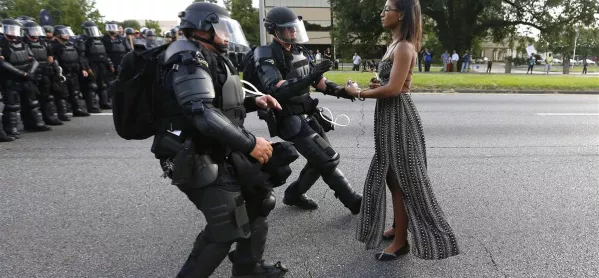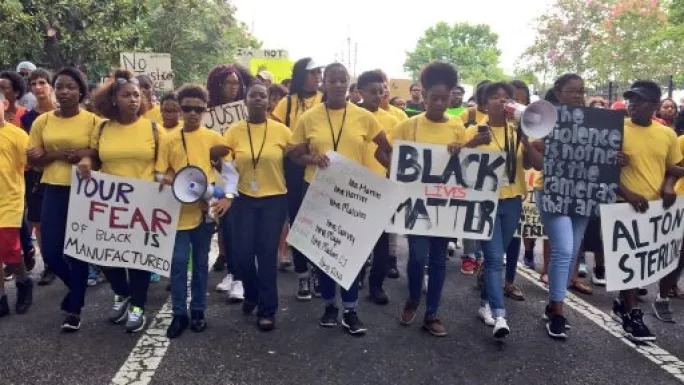- Home
- ‘Police violence is evidence of failure by schools to teach equality and diversity. Now let students lead the way ’
‘Police violence is evidence of failure by schools to teach equality and diversity. Now let students lead the way ’

Baton Rouge, LA - The perspiring temperatures outdoors were outdone by the racial climate created by years of police killings.
Indoors, the climate was slightly less heated as hundreds of co-eds and community members crammed in the African American Cultural Center and the adjacent Women’s Center on the campus of the Louisiana State University (LSU) in Baton Rouge on Thursday, July 7, to make protest signs in response to the killing of Alton Sterling, who two days earlier and less than 10 miles away was shot dead by a police officer in front of Triple S Food Mart in Baton Rouge.
“We wanted to let people have a space to just talk, be and make signs because I know that making signs is a form of grieving,” said Joseph Coco, matriculating doctoral student in Sociology at LSU and a principal organizer at the “sign making and information meeting.”
Whether it’s in Baton Rouge, St. Paul or elsewhere, black and brown youths’ race and proximity to unjust killings compel them to act. Students don’t really have choice. Not yet stunted by the sludge of complacency and outmoded political strategies that seemingly come with age, young people counter unflinchingly with brains and emotion.
Video footage, which sparked national outrage, revealed that Sterling didn’t brandish or present a weapon in such a way that warranted the fatal shots from his killer. Just a day after Sterling’s death, the fatal shooting of Philando Castile by a police officer was captured in real time through social media by his girlfriend who proclaimed in a news conference, “[T]hese police are not here to protect and serve us; they are here to assassinate us … because we are black.”
Communities should not worry if youth will mobilize around tragedy and racial injustice. Instead, they should fret over how adult school leaders move during strife. How schools respond to unrest, particularly police violence against black communities, reveals and predicts how that institution serves current and future students.
“We have a lot of concerned students that want to see things better, want to see things change and we’re giving them every opportunity to get their voices heard,” said F. King Alexander, president of the LSU system and chancellor of LSU. King was flanked by LSU board member James Williams and Baton Rouge City Council Member Tara Wicker as they addressed the crowd. The officials didn’t offer prescriptive solutions; they just provided space.
Kudos to university leaders who choose to learn from students.
The research on campus racial climate has posited that universities’ responses to integration in 1954 shaped the philosophy on how institutions treated students of color thereafter. Similarly, institutions have a choice as to how to respond to the integration epoch of this generation.
Universities and school districts that resisted integration in the past, have a choice to make today.
Police violence is evidence of school failure. Schools have not effectively taught the values of diversity, democracy or equity. In many cases, schools are explicitly used to divide communities.
Last year, the wealthier, mostly white section of Baton Rouge campaigned to secede from the city to create the city of St. George after failed attempts in 2013 to create a separate school district. Baton Rouge residents showed whom they consider members of their community and who deserves protection. So we shouldn’t be surprised by Sterling’s death.
The St. George’s effort failed, but the “separatist movement” goes beyond education.
Nor should we be surprised if schools, universities and other educational institutions don’t weigh-in on police violence. Silence is the accomplice of bigotry. Inaction is a byproduct of being ignorant to its consequences. The test-based accountability that leaders are apparently more responsive to is but a flame to the sun of the unjust accountability systems our students face everyday and sometimes die to.
Schools and colleges that choose to stay silent are actually teaching students, funders and the community to continue to bury their heads in the sand while bodies are buried in graves and prisons.
“Hopefully the momentum generated from LSU and all over can coalesce into something that is sustainable, accessible, intersectional, fully inclusive and can really work for this community,” said Coco.
The following Sunday, hundreds gathered at the Wesley United Methodist Church for a rally organized by the student group The Wave to march to the state capitol less than two miles away. A scattered, awaiting crowd flocked to the clarion calls of “student-led; student-led; student-led!”

Donning bright yellow t-shirts, approximately 35 youth headed a procession to the steps of the state capitol, on which students forcefully presented a poignant list of demands. Then, accompanied with a brass band, the students pranced in second-line parade style back to the church reminding the crowd why youth make the difference in social movements.
“Hasn’t it always historically been the youth, asked Myra Richardson, 17, a Baton Rouge High senior one of the founders of The Wave. “So shouldn’t we take ownership of that?”
Unfortunately, after the rally concluded with the departure of The Wave, SWAT dispersed a lingering crowd with tear gas. Arrests were also made.
As I march toward the centers of power that uphold the laws and policies that facilitate unjust policing, I will follow young people. It’s time for our schools and universities in Texas, Louisiana, Minnesota and around the U.S. to get in that line-up.
Dr. Andre Perry is the former founding dean of urban education at Davenport University in Grand Rapids, Mich.
This story was produced by The Hechinger Report, a nonprofit, independent news website focused on inequality and innovation in education. Read more columns by Andre Perry.
Want to keep up with the latest education news and opinion? Follow TES USA on Twitter and like TES USA on Facebook.
Keep reading for just £1 per month
You've reached your limit of free articles this month. Subscribe for £1 per month for three months and get:
- Unlimited access to all Tes magazine content
- Exclusive subscriber-only stories
- Award-winning email newsletters



